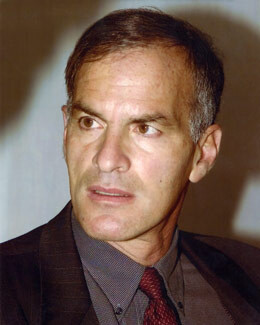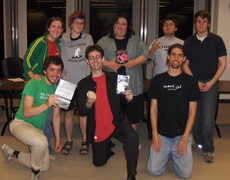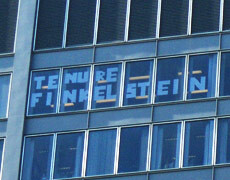The Electronic Intifada 13 June 2007

Norman Finkelstein
It begins with DePaul Assistant Professor Norman Finkelstein. Finkelstein has been writing on and speaking out against the Israeli occupation of Palestine since he received his doctorate at Princeton. He has published six books that have been translated into about 40 languages. This has not been easy for him to do. At every step of the way, Israel’s apologists have attempted to drag Finkelstein down.
Finkelstein began teaching at DePaul in 2000 and he was eligible for tenure this 2006-2007 school year. Finkelstein met all the requirements. His teaching is regarded by all as excellent. His scholarship far exceeds the demands of any scholarly institution, and he had completed service through his faculty governance responsibilities and his role as a public intellectual, speaking out across the country. His fellow faculty members in the Political Science Department agreed, and voted 9-3 to approve tenure. The College of Liberal Arts and Sciences (LA&S) tenure review board voted unanimously, 5-0 to approve him for tenure.
However this has not been unopposed by Israel’s apologists. Harvard law professor Alan Dershowitz, whose scholarship Finkelstein criticizes in his latest book, lobbied DePaul to deny Finkelstein tenure. By taking Finkelstein’s quotes of of context and libeling him as a “holocaust minimizer,” among other things, Dershowitz was able to influence three political science professors to write an anti-Finkelstein minority report. This minority report was essentially the basis for the LA&S Dean Charles Suchar’s letter recommending against tenure.
Seeing their favorite professor’s tenure in jeopardy, students at DePaul reacted. When Finkelstein met with the university level tenure board, 40 students rallied outside the meeting. They collected close to 800 signatures to support tenure, while those concerned about academic freedom signed online petitions calling for a fair tenure process.

DePaul students sitting-In President of DePaul Fr. Holtschneider’s office demanding tenure for Norman Finkelstein and Mehrene Larudee. (Matt Muchowski)

DePaul students taking part in the sit-in write “TENURE FINKELSTEIN” on the windows of Fr. Holtschneider’s office. (Matt Muchowski)
Things continued to become suspicious at DePaul. Alan Dershowitz claimed that he was only involved in the tenure process as he was asked by a political science professor to submit materials about Finkelstein. After students met with Fr. Holtschneider, however, it became clear that Dershowitz was lobbying the president, seeking a meeting with him, which Holtschneider claims was turned down.
More troubling was the fact that the administration was not following the DePaul faculty handbook on tenure. The handbook makes very clear that at every stage of the process, any vote or decision would be communicated to the professor. This was not done for Finkelstein. In their meeting with the DePaul president, students found out that in practice the university had not communicated the university level tenure board decision to professors for the last twenty years. For the last twenty years the administration has not been following the faculty handbook.
On Friday, 8 June, Fr. Holtschneider issued his decision that Finkelstein would not be granted tenure. More surprising was that International Studies Assistant Professor Mehrene Larudee was also denied tenure. Larudee had received unanimous support at both the department and college levels, and even received the support of the dean of LA&S. But she was a vocal critic of the Israeli occupation of Palestine and a vocal supporter of Finkelstein.
Finkelstein was given a three-page letter describing Holtschneider’s reasons for denying tenure, citing ad hominem attacks as a principal one. This contradicts the American Association of University Professors Statement of Collegiality that makes clear that issues like alleged “ad hominem attacks” are not criteria for tenure.
Students quickly mobilized. On Monday morning, 11 June, a dozen students entered Fr. Holtschneider’s office. They began the sit-in at the conference room. At 3:00 that afternoon, thirty students met with Fr. Holtschneider. They were dissatisfied with the answers he gave and made clear their demands for tenure for both professors.
Since then students have not left the office. They placed signs in the window that are visible on the street level, and have slept in shifts. Some have left to take tests and come back. The students’ actions have emboldened the faculty and the community. The faculty council is having a meeting on Wednesday to discuss the issue and, according the Chicago Sun-Times, may vote for a no-confidence measure on the President of DePaul who denied tenure.
A rally is expected at 11:00am Wednesday to support the sit-in, but the administration is telling students that they want the sit-in to end at 5:00pm Wednesday. It has become a test of wills to see who will blink first.
When Finkelstein appeared on Chicago Public Radio, he explained, “By a strange concatenation of events, DePaul University has become a battleground. … Number one, to defend academic freedom, which is under assault in our country, and is now under assault at DePaul University. And number two, it is a battleground about this hideous forty year old occupation. We as Americans have the right to speak out, to deplore the occupation of the Palestinian people by the Israeli government, which is supported by our tax payer dollars.”
Matt Muchowski is an alumn of DePaul University with a degree in Political Science. He has taken several classes with Norman Finkelstein and is currently writing “A People’s History of DePaul University.”
Related Links


